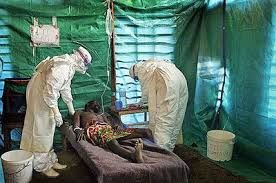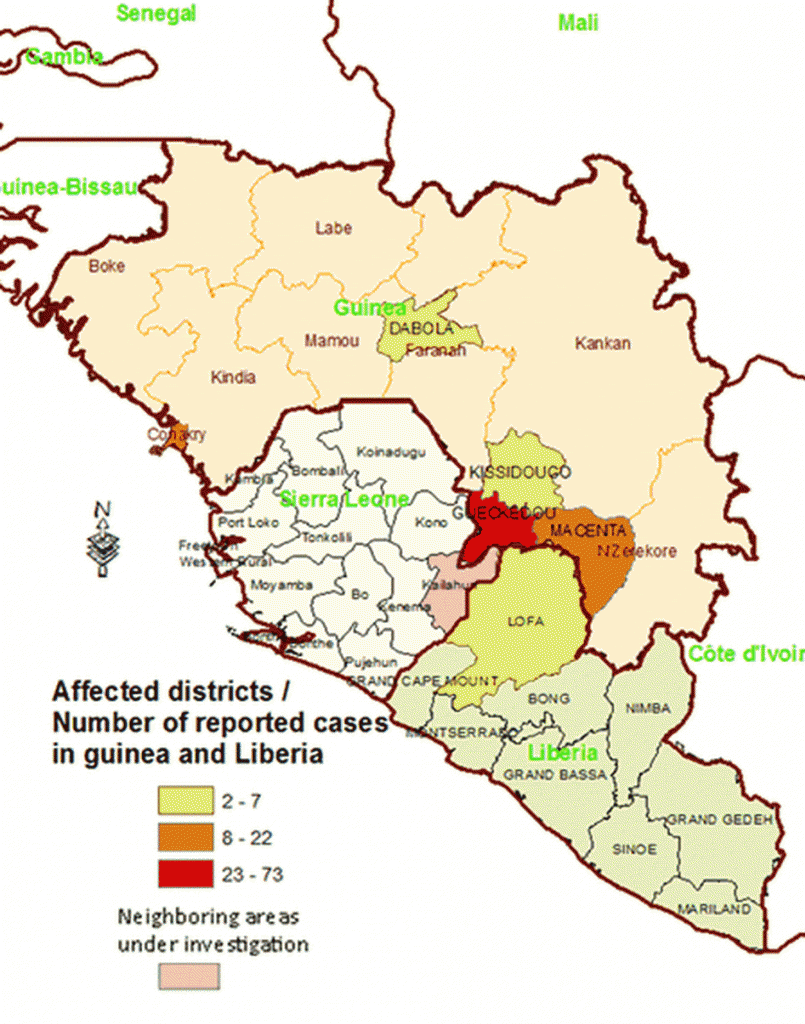
Terri Rupar, of The Washington Post reports that Doctors of the World Health Organization announced today that This is one of the most challenging Ebola outbreaks we have ever faced.’" The official death toll is now 101 in Guinea with 157 confirmed and suspected cases, and 7 death, and 23 suspected deaths in Liberia.
Doctors without Borders has accused the World Health Organization of down playing the severity of the "epidemic." The WHO insists on calling it an "outbreak. As an aside I just learn two nights ago, my son's girlfriend's sister is in Mali with Doctors Without Borders treating Ebola patients.
This afternoon the WHO has acknowledged points MSF (DWB) has been making for over a week. This Ebola outbreak is unprecedented in three ways:
1. It's spread across a number of countries.
Cases of Ebola have been found in multiple parts of Guinea, and there have been suspected cases in Sierra Leone, Ghana and Mali as well as the confirmed cases in Guinea and Liberia. To stop the spread, doctors and public health officials have to identify who's sick and who those people have contacted; there are three hot spots in Guinea, and two isolation wards being managed by Doctors Without Borders. Stephane Huggonet, a physician, also pointed out that there's a risk other countries could be affected. All that means a lot of communication and coordination. And the fact that it has spread to Guinea's capital, Conakry, adds another layer of complexity because more people could be exposed.
2. This part of Africa hasn't seen an Ebola outbreak before.
Major Ebola outbreaks have been seen before in Congo, Sudan, Gabon and Uganda, thousands of miles away. Those countries are sending help and sharing their experience, but Guinea and its neighbors haven't experienced an outbreak of Ebola before.
3. Misinformation, like Ebola, spreads quickly.
"We're dealing with quite a lethal infection, and because of that, these kinds of outbreaks are often surrounded by a great deal of fear and anxiety, creating rumors and making communications both challenging and very important," said Keiji Fukuda, WHO's assistant director-general for health security.

Health workers from Doctors Without Border suspended operations and fled from their center in Macenta, Guinea as angry crowds threw rocks accusing DWB of bringing Ebola to their village. The truth seems to be a bit more subtle as I've reported over the last two night. Health authority are separating anyone with flu like symptoms, and those reported in contact tracing, from their families into a first warehouse. If they develop symptoms of Ebola they are moved to a second warehouse to die.
Families are accusing health authorities of infecting those who may only have the flu, or only been identified with contact tracing, with Ebola by warehousing them together in this first vast warehouse. The health care workers bringing the water and food in those protective bio-protection suit do not change the suits between patients, it would be impossible.
(Nearly all the pictures of these centers and suits are from Getty Images which is extremely aggressive about copyrights, so if you wish to see these you should look under google Images under "Ebola"
Doctors Without Borders had to suspend its activities in Macenta in southeast Guinea because people began throwing rocks at them in response to a rumor that the health workers had brought Ebola into Guinea.
Dr. Huggonet, of the WHO, said on a call to news organizations this afternoon:
"The outbreak is not over," Huggonet said on the call. Officials expect to see cases for an additional two to four months, they said, and it's too early to say whether the number of new patients is decreasing. For now, they're working to treat the symptoms of those who have the disease and stop the transmission.
"It's absolutely critical to to get out as much accurate information as possible to the communities, to the countries that are affected," Fukuda said.
In previous "outbreaks" we seem to have had one "patient zero" who got infected from some animal source." So once health authorities became aware of the outbreak containing patients in that on village or area was relatively straight forward.
In this case we have multiple outbreak points. For example, a hunter in Liberia died 30 minutes after presented himself to health authorities. He had over 500 traps. If multiple people are becoming infected from infected animal populations it may not be possible to end this "outbreak" until local populations stop eating game meat which is a major food source in this area. Game meat that can be infected with Ebola includes primates, antelopes, gazelles, and bats. which are now banned in Guinea.

Boubacar Diallo Sarah Dilorenzo, of the AP also report this major annoucement from the WHO in, Officials Say Ebola Outbreak Could Last Months.
Dr. Keiji Fukuda of the World Health Organization conducted a major updating of news about the Ebola "outbreak" in West Africa this afternoon.
"We fully expect to be engaged in this outbreak for another two, three, four months," Fukuda, who is the assistant director-general of the health security and environment cluster at the U.N. health agency, told reporters on a conference call from Geneva.
Fukuda said that one of the biggest challenges for health workers has been combatting the fear and rumors that have sprung up around the outbreak. An angry crowd attacked a treatment center in Guinea last week, accusing Doctors Without Borders of bringing the virus to the country.
The disease also carries a stigma, and a Liberian official has urged the sick to seek treatment.
"The act of denial is a very critical instrument that will spread the disease wider in our country," Thomas Nagbe, director of disease control and prevention at the Liberian Health Ministry, told radio listeners.
In Guinea, the governor of Conakry said he fired a district official whom he accused of covering up a death potentially linked to Ebola and warned other officials they must report illnesses.
The suppression of data about cases will become more common when, or if, or nations start refusing cargo, and/or flights from afflicted regions. Saudi Arabia has already canceled visas from most West African nations for religious pilgrims. Cargo ship owners may not wish to have their vessels loaded with cargo they fear may be quarantined. These fears do not have to be based on truths to be economically and socially consequential. Nor is such behavior confined to remote uneducated areas.
Some here may remember in the early stages of the spread of the HIV epidemic, parents did not want their children attending class with a child infected with the virus even after doctors reassured them their children could not become infected by casual contact. In this case. Ebola can be contracted from casual contact, so can you imagine how much greater the fear might be in Conakry, Guidea, a city of 2 to 3 million people?
I will add update throughout the evening. I'm called away briefly on an errand.


